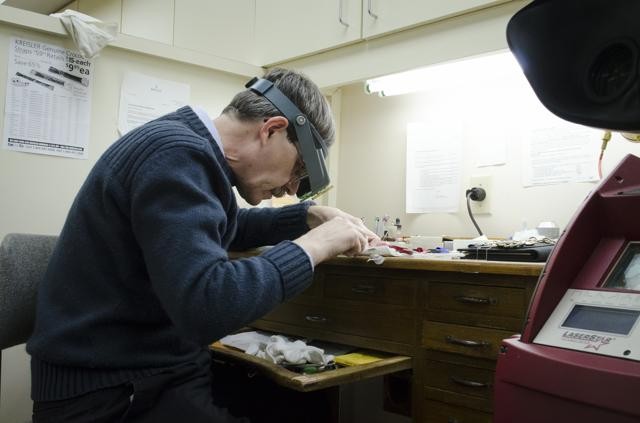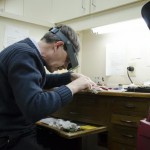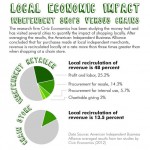- Wick and Greene Photo by Carrie Eidson
You visit an independently owned, locally based store where you meet the proprietor and purchase a scarf. The scarf was made by a local knitter with wool sourced from sheep on a nearby farm. At the farm, the feed is grown from seed distributed by a local company whose packets were printed by a local letterpress printer. And on and on. This hyperlocal supply chain is still very far from the reality of today’s markets, but if a locavore fairy tale could happen anywhere, Asheville seems poised to be that happily-ever-after place.
Maybe it’s already happening. There has been an upswing in awareness about shopping locally and the larger economic impact of buying from local, independent retailers. The idea of slow money is gaining public sentiment and support. And, along with increasing public awareness, the term “shop local” has become downright trendy. As Franzi Charen, the director of the Asheville Grown Business Alliance, explains it, “‘Local’ is a term, like ‘organic,’ that has been made popular through aggressive marketing campaigns. There are hundreds of campaigns and companies that bastardize the term.” Among examples of “localwashing,” she lists HSBC’s bid to be recognized as “The World's Local Bank” and Barnes & Noble’s ad banner, “All Bookselling Is Local.”
“Because of the marketing and advertising power large corporations have, bolstered by corporate welfare and enhanced by the hunger of Wall Street, alternative options are often drowned out,” says Charen. “We have been hoodwinked that a healthy economy depends on us feeding the beast of Wall Street.” With the big guys pitted against the little guys, and everyone competing for the same dollars in the marketplace, this could be a modern-day David and Goliath situation in the making.
National analysis shows that Asheville’s locally owned marketplace is faring quite well. The research firm Civic Economics, in partnership with the American Booksellers Association, studied metropolitan marketplaces across the country, comparing independent retailers with chain stores. In the 2011 report “The Indie City Index,” Asheville was ranked 53rd nationally in addition to placing in the top 10 for both our population category and in the South Atlantic region.
These figures are especially heartening considering that downtown Asheville’s vibrant shopping district almost wasn’t. In the 1980s, faced with the need to revitalize a moribund downtown, city leaders proposed a 700,000-square-foot mall, office tower and hotel complex that would have provided a facelift — at the cost of historic architecture and independently owned businesses. The grassroots organization Save Downtown Asheville Inc. fought and eventually defeated the plans for an urban mall. And even as that story has faded from the collective consciousness, a distaste for chains and big-box stores remains.
In a town that celebrates its uniqueness with “Keep Asheville Weird” bumper stickers, patronizing our independent businesses promotes local prosperity while celebrating the individuality we love. The economics of choosing local matters, but so does the unique collective identity that results from choosing T-shirts with screen-printed designs by Asheville-area artists rather than, say, the same mass-market products everyone else is wearing.






Before you comment
The comments section is here to provide a platform for civil dialogue on the issues we face together as a local community. Xpress is committed to offering this platform for all voices, but when the tone of the discussion gets nasty or strays off topic, we believe many people choose not to participate. Xpress editors are determined to moderate comments to ensure a constructive interchange is maintained. All comments judged not to be in keeping with the spirit of civil discourse will be removed and repeat violators will be banned. See here for our terms of service. Thank you for being part of this effort to promote respectful discussion.